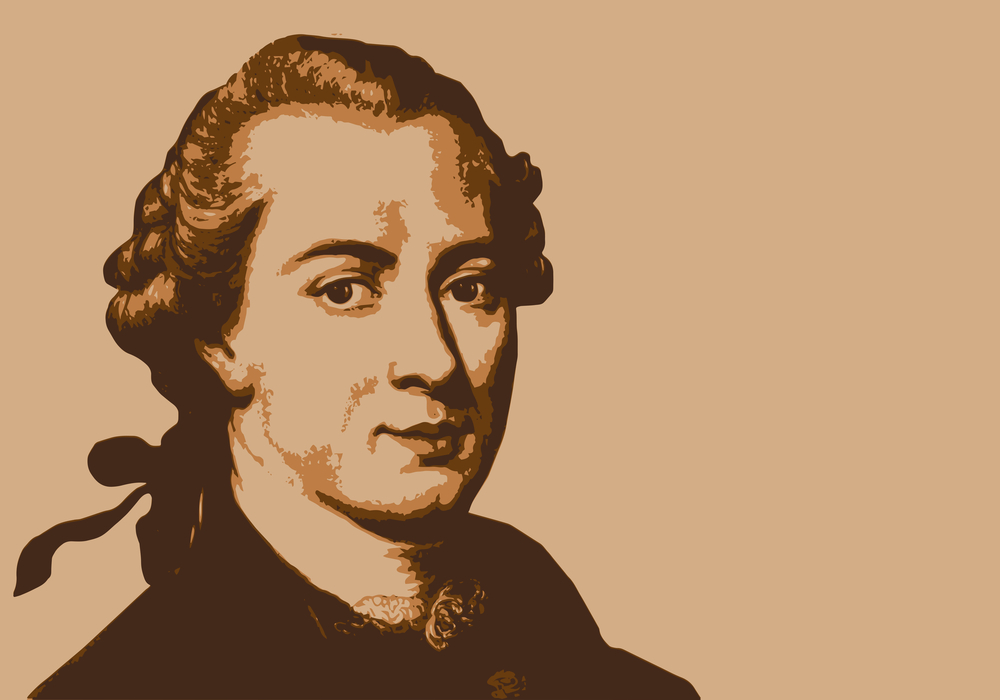Immanuel Kant published The Critique of Pure Reason in 1781. It was the same year the Rebel Alliance triumphed at Yorktown, Virginia.
The victory at Yorktown made possible the decline of the British “liberal” empire and the eventual rise of Washinton DCs “non-empire” empire. The “first critique” made possible the rise of Kant into the pantheon of western philosophical “big rocks,” alongside Plato and Aristotle.
Kant created a shockingly contemporary interpretation of reality without recourse to the as yet to be conceptualized theory of evolution by natural selection or quantum field theory with gravity. Talk about being philosophically disadvantaged!
Of course, the modern state of Israel had also yet to be founded. Kant was blessed to conduct his inquiries without the Zionist entity’s ongoing “plausibly genocidal” genocide being relentlessly live-streamed at him 24/7 and without increasingly sickening hasbara being desperately deployed in an attempt to make night into day. Yes, it was good to be Kant.
As we have seen, hasbara can be viewed as the rational cognition of the Israeli state; Zionism’s version of Kant’s pure reason. Whereas pure reason discovers itself in the training ground of noumena experienced as phenomena, hasbara discovers itself by interacting with the state of Israel experienced as Zionism. But we can push the analogy deeper.
Kant’s inquiry into pure reason focused on logic and epistemology, but he also took up the “task of preparing a firm foundation for those majestic edifices of moral science.”
Constructing that majestic edifice was the project of “the second critique,” The Critique of Practical Reason. Kant was profound. He was also terrible at writing clearly; some would say terrible at writing. Thus, his work has been obsessively subjected to sprawling and contentious interpretation. Scholars can’t even refer to different interpretations of Kant without using a word no one’s ever heard of before: exegesis.
Listening to many scholars interpret Kant is like listening to a teenager explain the etymology of “skibidi toilet rizz.” You don’t know what they’re talking about, and you suspect they also don’t know what they’re talking about. Fortunately, most (if not all) Kant exegesis serves our humble analogy satisfactorily.
What is practical hasbara up to? What majestic edifice of moral science has it built? What is the central normative claim of the Zionist project? The answer is obvious to anyone who reads Antiwar.com. Practical hasbara demands that everything and everyone be entirely subordinated to the state of Israel. In this respect, hasbara is similar to Leninist “partiinost’” (party spirit or party mindedness).
Like Leninism’s commitment to The Party™, hasbara understands that the Israeli state is paramount, and that Zionist ideology cannot be taken too seriously:
“Anyone who believed in the ideology might question the leader’s conformity to it. He might recognize that the Marxist-Leninist Party was acting against Marxism-Leninism as the Party itself defined it; or he might compare Stalin’s statements today with Stalin’s statements yesterday. ‘The citizen belongs to the state and must have no other loyalty, not even to the state ideology,’ [Leszek] Kołakowski observes.”
As the philosopher Slavoj Zizek said, “Taking the official ideology seriously is the first step to dissidence.”
Or as Libertarian Institute Director Scott Horton puts it, believing in nothing might put one at risk of falling for anything, but believing in anything puts one at risk of noticing that something is wrong.
Imagine someone indoctrinated by passages like this gem from Z is for Zionism:
“…Israel does an excellent job defending itself. Israel has one of the most powerful militaries in the world. Israel is strong, smart, confident, successful and gives Jews all around the world pride. Israel is thriving.”
Whatever transpires in that person’s mind the first time they hear about the “Mass Hannibal Directive” must be…complicated. What must they think when they see the Israeli police beating the family members of hostages?
A good hasbara maker (a Zionist version of Leninism’s Nikolai Bukharin) must be able to let go of the ideology, deploy the approved narrative, and never confront the reality that the Israeli state is a monster that eats its own people. And the monster is very, very, very hungry.
The mentality that allowed Soviet ideologues to deny the terror famine in Ukraine, or Iraqi propagandists to deny their nation had been conquered by the empire is integral to hasbara.
Israel is collapsing. Its civilians are kept in a state of eloi-like ignorance while its soldiers are dying prosecuting an unnecessary genocide. Its economy is approaching third world dysfunction. It is becoming a global pariah and its only tourism is visits from Michael Rapaport. But Israel’s little Bukharins keep telling us it’s all going very well!
Of course they do. The little hasbara Bukharins belong to the Zionist entity and must have no other loyalty.

































